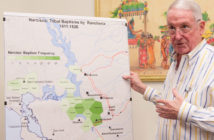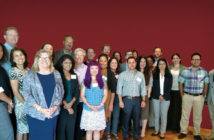Wes Bernardini, archaeologist and incoming Farquhar Chair of the American Southwest, has spent a career aligning his research interests with those of the Hopi Tribe he is studying
For Wes Bernardini, the Hopi Tribe has been a source of abiding interest since graduate school. On a weekend visit to the mountains near Flagstaff, he caught his first glimpse of the Hopi Mesas, and “it was just one of those hair-on-the-back-of-your-neck-stands-up moments,” he says. “I thought, ‘I want to work here!’”
For the past 15 years, he has returned every summer, usually with students in tow, to study and record ancestral Hopi sites. Now, the professor of sociology and anthropology is the incoming Farquhar Chair of the American Southwest. He replaces James Sandos, a Redlands history professor and expert in the history of California missions, who held the professorship for two decades before his retirement.
Bernardini’s close working relationship with the Hopi began back in the ’90s. During an “intimidating meeting” with 15 elderly Hopi men, Bernardini revealed that he was not entirely sure what he planned to research. “That turned out to be what they wanted to hear,” he says. “Before, people came in with big plans and just wanted the tribe to sign off on them. This started us out on the right foot as collaborators.”
Bernardini’s work has often focused on projects aimed at preserving Hopi cultural heritage—he successfully nominated the rock art site of Tutuveni and the 300-year-old village of Walpi to be listed on the World Monuments Fund “Watch List” of the 100 most endangered cultural resources in the world.
Recently, Bernardini partnered with Nate Strout, director of spatial technology in the University’s Center for Spatial Studies, and students in the Master of Science in Geographic Information Systems (GIS) program to put GIS to work exploring the ancestral Hopi landscape. The plan is to incorporate this interactive tool into the Hopi High School curriculum.
University of Redlands students participating in Bernardini’s lab and field work do survey and mapping; record sites; wash, label, and sort artifacts in the lab; and tabulate the results. This experience pays off after graduation—former students have parlayed these varying skills into jobs with the National Park Service, private industry, museums and even tech companies like Apple.
“They see how the entire scientific process works,” he says. “Learning how to produce new knowledge—that’s a life skill that’s useful beyond archaeology.”
For decades, a forward-thinking gift from a U of R Legacy Family has contributed to the study of the American Southwest.
In the 1970s, Vernon Farquhar ’21 and Helen Hedstrom Farquhar ’22 donated their vast collection of items related to the American Southwest to the Armacost Library so students could use these books, slides and other materials for academic research. In the late 1980s, following Vernon’s death, Donald D. Farquhar ’46 and Kay Wilson ’46 Farquhar and their children established the Farquhar Professor of the American Southwest Endowed Chair.
Endowed chairs like this one give universities the opportunity to attract and retain committed professors, covering their salaries and faculty development. In particular, the Farquhar professorship has encouraged and promoted the teaching of the American Southwest, while fostering excellence in scholarly research throughout the generations.





